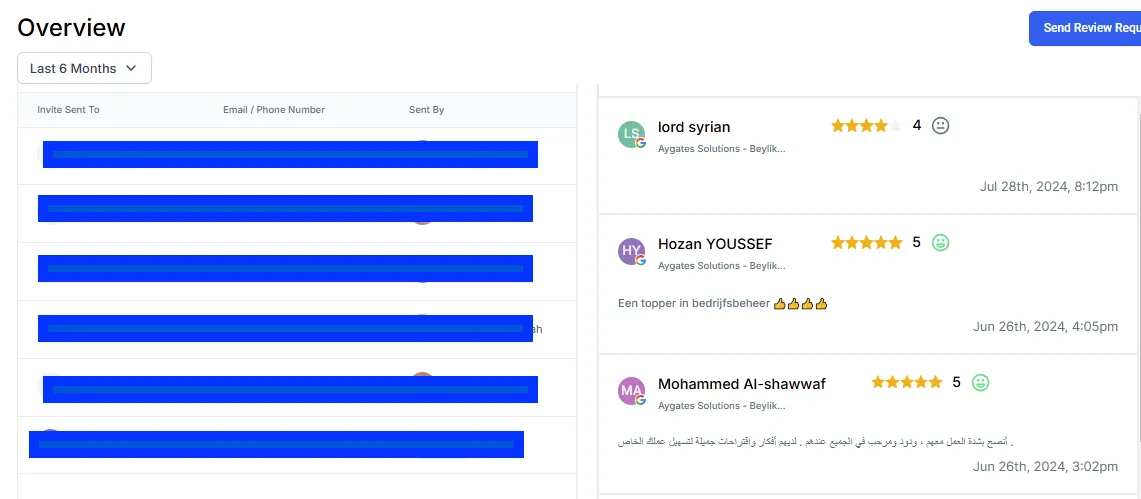In today’s digital-first world, a business’s reputation can make or break its success. Consumers often rely on online reviews, social media, and search engine results to form opinions about a company before making purchasing decisions. This is where business reputation management software steps in, providing businesses with tools to monitor, manage, and improve their online presence effectively.
What is Reputation Management Software?
Reputation management software is a digital tool designed to help businesses track, manage, and improve how they are perceived online. These tools consolidate data from various online platforms such as review websites, social media, and search engine results to give businesses actionable insights into their reputation.
Key functionalities of reputation management software include:
-
Review Monitoring and Management:
-
Aggregates reviews from platforms like Google, Yelp, Facebook, and TripAdvisor.
-
Allows businesses to respond to reviews directly, showcasing active engagement.

-
-
Sentiment Analysis:
-
Analyzes customer feedback to identify positive, neutral, and negative sentiments.
-
Provides insights into recurring themes, helping businesses address pain points.
-
-
Social Media Monitoring:
-
Tracks mentions and conversations about the brand on social media.
-
Enables timely responses to customer inquiries or complaints.
-
-
SEO and Search Engine Monitoring:
-
Ensures the business appears favorably in search engine results.
-
Alerts businesses about any negative content that could harm their brand.

-
-
Reporting and Analytics:
-
Offers detailed reports on reputation metrics.
-
Helps measure the impact of reputation management efforts.
-
-
Automation Features:
-
Automates review requests, reminders, and follow-ups.
-
Streamlines repetitive tasks, saving time for busy teams.

-
How Businesses Are Benefiting From Reputation Management Software
Whether you’re a small business or a global enterprise, reputation management software can be a game-changer. Here’s how businesses of all sizes benefit:
1. Building Trust and Credibility
-
Positive online reviews and high ratings foster trust among potential customers.
-
By promptly addressing negative feedback, businesses demonstrate accountability and commitment to customer satisfaction.
2. Increasing Customer Retention
-
Listening to and acting on customer feedback improves the overall experience, encouraging repeat business.
3. Enhanced Marketing Efforts
-
Highlighting positive reviews and testimonials in marketing campaigns boosts credibility.
-
Insights from customer feedback can refine marketing strategies.
4. Time and Cost Savings Through Automation
-
Automating tasks like review requests reduces manual effort, enabling businesses to focus on core operations.
-
Small businesses can achieve significant results without the need for a large team.
5. Improved Search Engine Visibility
-
Responding to reviews and generating fresh customer feedback signals activity to search engines, improving local SEO rankings.
6. Crisis Management
-
Real-time alerts help businesses address negative reviews or damaging content before they escalate.
-
Minimizes the risk of long-term reputation damage.
Reputation Management Software for Small Businesses & Enterprises
For small businesses, reputation management software is an invaluable tool. Limited resources often make it challenging to manually monitor online feedback, but automation and analytics tools bridge the gap effectively. Features tailored for small businesses include:
-
Affordable pricing tiers.
-
Easy-to-use dashboards.
-
Local SEO enhancements to drive nearby customer traffic.
Larger enterprises benefit from advanced capabilities such as:
-
Multi-location support to manage reputation across various regions.
-
AI-driven insights for complex sentiment analysis.
-
Integration with CRM systems to provide a unified view of customer interactions.
Choosing the Right Reputation Management Software
When selecting business reputation management software, consider the following:
-
Scalability: Ensure the software grows with your business.
-
Ease of Use: A user-friendly interface saves time and minimizes the learning curve.
-
Integration: Compatibility with your CRM, email marketing, or social media platforms ensures seamless workflows.
-
Cost: Look for pricing plans that align with your budget and offer value.
-
Customer Support: Reliable support can make a significant difference, especially during onboarding.
Final Thoughts
In a competitive market, maintaining a strong online reputation isn’t just an option—it’s a necessity. From boosting customer trust to driving growth, reputation management software empowers businesses to stay ahead. Whether you’re a small business owner or managing a global enterprise, these tools can automate critical tasks and help you focus on what truly matters—delivering exceptional experiences to your customers.
Start exploring the right online reputation management software today and take control of your brand’s narrative!






